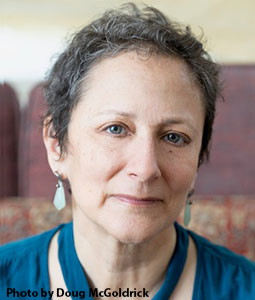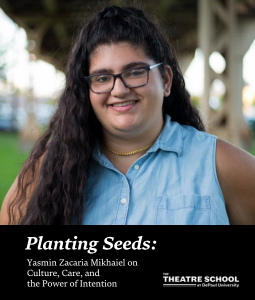/conservatory/undergraduate/dramaturgy-criticism/PublishingImages/dramaturgy2.jpg
RandomStandardImageHeaderWH1
The Theatre School’s Bachelor of Fine Arts (BFA) degree in dramaturgy/criticism helps students explore their critical thinking and writing skills for a variety of applications in theatre, museums, archives, film, journalism, agenting, startups, oral history, and other realms, including graduate school. The four-year curriculum provides students with tools—script analysis, dramatic theory, and new play development – and practical application of those tools in our production process.
Request InformationVisitApply OnlineScholarship
Check out our quarterly newsletter, The Grappler! Dramaturgs who have completed our program continue their studies in graduate programs such as the School of Drama at Yale University, the University of Texas at Austin, Georgetown University (history), New York University (performance studies, film studies, drama therapy), the University of Illinois at Urbana-Champaign, University of California-Santa Barbara, and the University of Amsterdam (masters in International Dramaturgy). Students have published in
American Theatre,
Howlround Theatre Commons,
Chicago Reader, and
The Chicago Tribune and have worked at the following places:
Dramaturgs who have completed our program continue their studies in graduate programs such as the School of Drama at Yale University, the University of Texas at Austin, Georgetown University (history), New York University (performance studies, film studies, drama therapy), the University of Illinois at Urbana-Champaign, University of California-Santa Barbara, and the University of Amsterdam (masters in International Dramaturgy). Students have published in
American Theatre,
Howlround Theatre Commons,
Chicago Reader, and
The Chicago Tribune and have worked at the following places:
BFA Dramaturgy/Criticism Curriculum
The first year curriculum is taken in collaboration with other theatre studies students and is an immersion into the culture of theatrical production and literature. Coursework includes script analysis, theatre history, and performance to facilitate critical thinking, and an experiential understanding of the theatrical process. Students also participate in two crew assignments in various areas of production.
In the second year, students move into the dramaturgy/criticism curriculum and focus on an introduction to production dramaturgy, its historical precedent, and educational outreach. Students also take coursework in design or technical areas as well as in English, literature, and other areas of interest. Students participate in the production season as dramaturgs and assistant production dramaturgs.
Third-year students hone their critical thinking and writing skills through dramatic theory and journalistic criticism courses. Students also explore the production process through directing coursework, and can engage in elective theatre, English, or communication coursework. Students continue to participate in our season as production dramaturgs and participate in formal portfolio evaluations.
The fourth year is a transition year, further developing students’ abilities and preparing them to enter the profession. Coursework includes internships, various career and networking opportunities, practical application of the students’ skills, and elective coursework in the individual area of interest. Students continue to participate in our season as production dramaturgs and are placed in a professional internship of their choosing.
During each portfolio review, the program showcases the work of students. They can use these portfolios to move into the professional world.
Featured Faculty
Students learn from a distinguished and award-winning faculty of professional dramaturgs, directors, and arts writers both in the classroom and through individual guidance and advising. They receive formal and informal feedback from faculty through continual evaluation of their work and portfolio presentations.
 Rachel Shteir | Head of Dramaturgy/Criticism
Rachel Shteir | Head of Dramaturgy/Criticism Rachel Shteir, Head of Dramaturgy at The Theatre School, brings extensive experience and insight to the program, guiding the next generation of theatre artists and critics. She was awarded a 2025 Guggenheim Fellowship: an honor recognizing her outstanding contributions as a scholar, writer, and advocate for the arts. A celebrated author and cultural critic, Shteir joins a cohort of visionary thinkers selected for their impact across the arts and humanities. The fellowship will support the completion of her forthcoming book,
Why Theater Matters, under contract with Yale University Press.
Read more about Shteir’s recognition from the Guggenheim Foundation here.
Alumni Snapshot
 Yasmin Zacaria Mikhaiel
Yasmin Zacaria Mikhaiel
Liberal Studies
In addition to the major's requirements, students complete 52 quarterly credit hours (13 courses) in the university’s
Liberal Studies Program. Courses are taken in theatre history, writing, quantitative reasoning and technological literacy, philosophical inquiry, religious dimensions, scientific inquiry, understanding the past, multiculturalism in the United States, and electives. These liberal studies courses are scheduled during the first three years of the program.
“Our student dramaturgs infuse the creative process with a wide variety of research and critical perspectives to help define the world of a play. They use multimedia tools as well as old-school ones to act as ambassadors to the audience. They collaborate with students from all disciplines, and they are involved at many difference levels of production.”
Head of Dramaturgy and Criticism
Get more information
Complete the form below to receive more information about this degree program.
If the form fails to load or displays incorrectly,
please fill out an
alternate form.